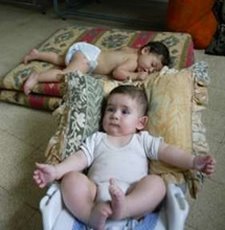Above Lebanese babies rest in a school in Beirut July 20, 2006
In small pockets of misery and distress tucked away across Beirut, thousands of Lebanese refugees are sheltering from Israel's relentless bombing.Up to half a million people have been displaced throughout Lebanon, according to Roberto Laurenti, the Beirut representative of the United Nations Children's Fund, sparking a humanitarian disaster.
For many refugees to Beirut the first port of call is Sanayeh, a once attractive park no bigger than a London garden square. Two hundred people slept on the grass there last night. Another 4,800, including about 950 babies less than two years old, who arrived over the past few days have been sent to 28 Beirut schools which have opened their doors. Thousands more people from the south have moved to friends and relatives or rented flats. Many are in other towns or in villages in the mountains, well away from the border, though nowhere in Lebanon is entirely safe.
At a Beirut school run by the Sisters of Charity convent, mattresses on the floor have replaced desks and chairs. Hadije Jabar sits on one of them. On Tuesday she and nine people from her extended family piled into cars and bumped across fields for a terrifying journey to Beirut, a six-hour trip which normally takes two. They were just in time. Her home town of Srifa was hit by Israeli missiles yesterday, killing at least 17.
"It had been struck several times already," she says. "Houses were hit. The children were scared, so we decided to leave." Her husband lay on a mattress in a corner of the classroom. Prone to epilepsy, he is too weak to move.
In the neighbouring class, Hamid Jindi, 87, recounts her escape with 14 relatives from the southern Beirut suburb of Dahieh. It used to contain several Hizbullah buildings, including the militia's television station since flattened in Israeli assaults. "We came with nothing except the clothes we are wearing. Only God knows how long we'll be here."
For Sister Genevieve, a middle-aged Lebanese nun at the convent, which is sheltering 160 people, the emergency is nothing new. Nor is the fact that as Christians they are helping Muslim families. "This is the fourth time we have taken refugees in," she says. "In 1975 and 1982 in the civil war, in 1996 when the Israelis were active in southern Lebanon, and now. But this time it's worse. The whole world, even France, has abandoned Lebanon. It's a disgrace. All the foreigners are leaving. The UN is sending its staff away. God will not abandon us."
Many convent helpers are themselves displaced. Ali Hamadi wears the T-shirt of Offer Joy, a Lebanese NGO set up in the civil war to bring people of different faiths together that is now in charge of providing supplies for the displaced.
He is a schoolteacher from Mais el-Jebel, a settlement close to the Israeli border. Ordered to Beirut by the education ministry two weeks ago to mark end-of-term exams, he was cut off from his family by the bombing. While we talk, a refugee from the same area runs into the room with a report of a new attack. We phone a Mais el-Jebel resident, who does not want his name used. Landlines are still working but after seven days without electricity, mobiles have run down. "I'm in a basement," says the voice. "We've been sheltering here since yesterday. We hear frequent heavy explosions. If I were to leave the house, I could see the Israeli border, but most of us have not been outside for a week. Occasionally someone runs to the well for water. Without electricity the pumps don't work. Food is running out, and we can't last long."
He compares the current trauma with the civil war and the last Israeli occupation which ended in 2000. "Now it's much worse," he says, "the bombing is so intense. At that time you could leave your house more often." At Beirut's Mount Lebanon hospital Rula Zahar, the chief accountant, makes a similar point. "The bombs we used to throw at each other were toys compared to this. These missiles are so heavy. We are surrounded by land, sea, and air," she says.
The multi-storey modern hospital normally has 120 patients. Now this is down to 20. The rest have been discharged, even though medical needs are mounting because of the Israeli onslaught. The hospital's upper floors have been evacuated and makeshift wards set up in the basement. The hospital has its own generator but the diesel needed to keep it going is running low. Oxygen is in short supply.
The hospital is on the edge of Dahieh, the Israelis' main target in Beirut. "Patients were frightened by the sound of explosions and we were worried the windows would shatter," says Ms Zahar whose family has escaped to her parents' house in the mountains above Beirut. "The only patients still upstairs are the psychiatric cases. They refused to move and we didn't feel we should put pressure on them."
by Jonathan Steele
Source: Common Dreams


No comments:
Post a Comment